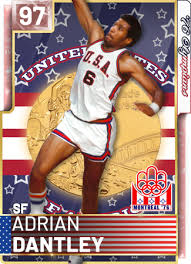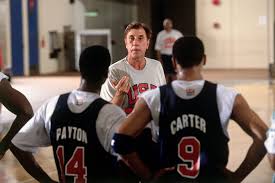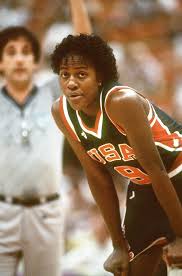The NBA Finals date back to 1947 (when they were known as the Basketball Association of America Finals) and the very 1st NCAA tourney was held in 1939. Olympic basketball competition is even older: it debuted as a demonstration event in 1904 and the men’s version became a medal sport in 1936, with the women finally getting their chance to go for the gold in 1976. The United States has dominated Olympic basketball competition from the start: the men have won 15 gold medals in the 18 tournaments they have participated in during the past 84 years, while the women have won 8 gold medals in the 10 tournaments in which they have competed during the past 44 years. Those of you who were looking forward to the 2020 Olympics opening ceremonies in Tokyo on July 24, 2020 will have to wait an extra 364 days, as the coronavirus caused a postponement until July 23, 2021. Due to the absence of college basketball since mid-March, HoopsHD’s Jon Teitel decided to fill the void by trying to interview as many prior Olympic players/coaches as possible so that you have something to read this summer while not watching the Summer Games. We continue our coverage by chatting with Adrian Dantley about playing in 1 of the biggest upsets in NCAA history and winning a gold medal in 1976. Today marks the 44th anniversary of Buffalo selecting him 6th overall in the 1976 NBA Draft.
 photo credit (2kmtcentral.com)
photo credit (2kmtcentral.com)
You went 117-7 at DeMatha High School and were named an All-American while playing center for legendary coach Morgan Wootten: what made Wootten such a great coach? He was a great communicator and a man of his word. He had great character and you could always trust him.
As a freshman at Notre Dame in 1974 you played in 1 of the biggest upsets in college basketball history (the Irish scored the final 12 PTS in a 1-PT upset to break UCLA’s record 88-game winning streak): how were you able to beat the Bruins, and where does that rank among the most exciting games of your career? It is probably the #1 game of my career. We beat them because we just did not quit. Coach Digger Phelps had a great game plan and we forced our will on them.
What are your memories of the 1974 NCAA tourney (John Shumate had 34 PTS/17 REB, but Campy Russell bested him with 36 PTS/18 REB in a 9-PT win by Michigan)? That was the worst game of my career as Wolverines guard Wayman Britt held me to only 2 PTS.
Take me through the 1975 NCAA tourney:
You had 33 PTS/10 REB in a 6-PT win over Kansas: what did you learn from the 1974 tourney that helped you in 1975? I did not learn a lot but it helped just to have some more experience so I was not as uptight.
You had 25 PTS/11 REB, but John Lucas scored 24 PTS in a win by Maryland: could you tell at the time that Lucas was going to become a star? I knew John when I was still in high school: he actually recruited me to go to Maryland.
You were a 2-time All-American and were named national POY in 1976: what did it mean to you to win such outstanding honors? It showed that my hard work/dedication paid off: I sacrificed a lot every summer. I also have to thank my teammates/coaches because I could not have done it without them.
Take me through the 1976 NCAA tourney:
You scored 27 PTS and Toby Knight made a last-second tip-in to clinch a 1-PT win over Cincinnati: was it extra-special to beat the Bearcats after they had beaten you in the 3rd-place game in 1975? It feels pretty good anytime you can beat a team that beat you before. Anything can happen in the tourney so you have to play out every single second.
You scored 31 PTS in a 4-PT loss to eventual runner-up Michigan: how close did you come to winning that game, and did you know at the time that you had played your final college game? That was a payback game against Britt: I played really well but we did not win. I was preparing to go pro but was not 100% sure.
At the 1976 Olympics in Montreal you were the leading scorer for team USA and you beat Yugoslavia for the gold medal: what was it like to play for Coach Dean Smith, and what did it mean to you to win the gold? It was a great honor to play for Coach Smith: he gave me a lot of insight. I thought about going to UNC because he was a great coach. We had a very good team and were happy to win. We wanted to play Russia for the gold but they were upset by Yugoslavia.
In the summer of 1976 you were drafted 6th overall by Buffalo (2 spots ahead of Robert Parish): why did you decide to leave school after your junior year, and what did it mean to you to get drafted? It was always my dream to go pro. I went to summer school each summer so I only needed a few more credits to graduate.
You were named NBA ROY in 1977 but were traded to the Pacers in the offseason (becoming the 1st ROY in any pro sport to be traded following his rookie season): how were you able to make such a smooth transition from college to the pros, and why on earth did you get traded? I think that I got traded because we had an owner who wanted an ABA player. The key to the transition is to be prepared: when you play against the best guys every night you have to make sure you get proper rest, do your scouting, etc.
In 1984 you tied a NBA record (set by Wilt Chamberlain during his 100-PT game) for most FT made in a regular-season game with 28 vs. Houston: what is the secret to being a great FT shooter, and do you remember your 1 miss? I remember the 1 miss because I did not miss a lot that night. The key is practice but also practicing under different circumstances. Since I liked to run I would focus on making 2 FT or else having to run some sprints.
In the 1984 All-Star Game you had a 9-PT OT loss to the East: how on earth did you lose with a Hall of Fame starting lineup of you/Kareem Abdul-Jabbar/Magic Johnson/George Gervin/Alex English? All-Star games do not mean a lot when it comes to talent, as we saw with Miami several years ago. Everyone gets to play so it takes a whole team effort. I am pretty sure that the East squad had some Hall of Famers as well!
In Game 5 of the 1987 Eastern Conference Finals as a player for Detroit, Larry Bird stole an inbounds pass from Isiah Thomas and passed it to Dennis Johnson for a 1-PT win en route to winning the series in 7 games: how amazing was that play, and how devastating was that loss? It was a great play and a credit to Bird never quitting. It was pretty devastating but it just goes to show that the game is not over until the final buzzer. In pro sports the unexpected can happen.
Take me through the 1988 NBA Finals:
In Game 6 Thomas scored a Finals-record 25 PTS in the 3rd quarter (11-13 FG) despite playing on a sprained ankle: how was he able to battle through the pain and dominate for an entire quarter? He has always been a competitor and has a big heart so he could play through the pain.
In Game 7 Finals MVP James Worthy had 36 PTS/16 REB/10 AST (the only triple-double of his career): were you surprise that it was Worthy who took over the final game, and do you think that Magic should have been called for a foul after knocking Thomas to the ground in the final seconds? I was not surprised by Worthy’s performance: he was a great player. As far as the no-call…that is the referee’s decision.
You averaged 30+ PPG during each season from 1981-1984, led the league in scoring twice (1981/1984), and your 24.3 career PPG (tied with Larry Bird) remains top-20 all-time : what is the secret to being a great scorer? You have to be in great shape, get to the FT line, and shoot over 50% from the field.
You were inducted into the Hall of Fame in 2008: where does that rank among your career highlights? It ranks #1: it was a great honor to be recognized as 1 of the best.









